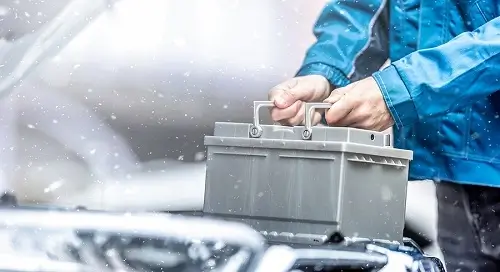Winter weather is tough on car batteries. In fact, when the temperature is below 32 degrees, car batteries lose 35% of their strength, and at zero degrees they lose 60%. If you’re not prepared, you may find yourself stranded on the side of the road with a dead battery and an expensive tow in your future. Use these easy strategies for keeping your car battery from dying during the winter months.
How Do Car Batteries Work?
Car batteries are cells that store chemical energy and turn it into electrical energy when needed. They rely on a lead-acid chemical reaction that ignites a short burst of energy that turns on your lights, accessories and engine. Once the car is moving, the energy supplied to the engine comes from the alternator.
Car batteries are charged by the movement of your car driving; if they’re dead, they can also be jump started by a different car. However, once a battery stops holding a charge within its cells, it’s time to get a new one.
Most car batteries have a lifespan of three to five years, but this can be shortened by extreme weather conditions. If you live somewhere with extreme temperatures, you might have to replace your battery every year.
Why Winter Is Hard on Car Batteries
In the winter, car batteries are forced to work harder to get your engine going. Cold temperatures thicken your engine’s oil, which makes it move more slowly. This increases the amount of power needed by your battery to kickstart important processes. If the amount of charge in your battery is already reduced by the cold weather, you may find yourself with a vehicle that’s unable to start.
In addition, cold temperatures affect the chemical reaction that takes place inside the battery when you turn your car on. The cold makes your battery more sluggish, and it requires more time to successfully ignite.
Finally, the amount of technology you have in your car can take a big toll on the battery’s ability to do its job. Seat warmers, headlights, radio and electronic device chargers all demand power from the battery to start. This can be overwhelming and cause the battery to fail, especially if it’s older and already struggling to hold a charge.
Since your car’s battery is already working at a disadvantage during the winter months, you won’t be surprised to learn about the things that will almost guarantee your car’s battery dies when it’s a cold morning and you’re trying to hit the road. Here are the top reasons why batteries die and how to prevent it.
1. Make Sure Your Car Is Powered Down Properly
The biggest reason why your battery is dying is probably you. When it’s dark and cold outside, it’s easier to focus on rushing inside the house instead of making sure your car is properly powered down.
Make sure the headlights and cabin lights are off and the doors are completely closed; any light will drain the battery overnight. Unplug accessories, including cigarette lighter socket chargers, so that they don’t try and steal power when you turn your car on the next time.
2. Check for Corrosion or Loose Cables
Corrosion around your battery’s terminals can negatively affect the connection between the battery’s cell and its cables. If the terminals are corroded or the cables are loose, your battery won’t be able to successfully transfer its energy to the engine.
Regularly inspect the terminals for rust and the cables for cracking or breaking, and take your car into a trusted repair shop if you’re concerned about any issues.
3. Protect the Battery From Freezing Temperatures
Everything moves more slowly in the winter, including your battery. Have the battery tested before the weather gets too cold to make sure it’s able to hold a charge and replace it if it’s too old.
It’s also helpful to have your car’s oil changed, because old oil is thicker than new and will have more difficulty moving through the engine. A battery blanket is affordable and can keep your battery warm throughout the night so it’s ready to go in the morning.
Finally, try to park in a covered garage or downwind so that the battery isn’t exposed to the elements.
If you have the unfortunate luck of a dead car battery, it’s important to be prepared for prolonged exposure to cold weather while you’re waiting for help. Keep an emergency kit in your car that includes warm blankets, a phone battery bank, water and snacks. Flares may also be appropriate depending on your situation. It’s also a good idea to keep jumper cables in your car year-round.
Avoid Car Battery Surprises With Routine Maintenance
All of these tips will help you avoid a dead battery, but the most effective strategy for keeping your car battery running during the winter is with regular maintenance. When you bring your vehicle to a trusted auto repair shop, an expert technician will inspect your battery and let you know if there are any problems. They can test your battery, often for free, and let you know what its life span looks like.
Ask the technician about your battery’s cold cranking amps, or CCA, as well. This number refers to the battery’s ability to start a car during freezing weather. The higher the CCA number, the better the battery is at performing in the cold. Ensuring you’re using the right battery for your climate can help you avoid dead battery problems.
This winter, don’t get stuck out in the cold. These simple strategies will help you make sure that your car successfully starts every time.

